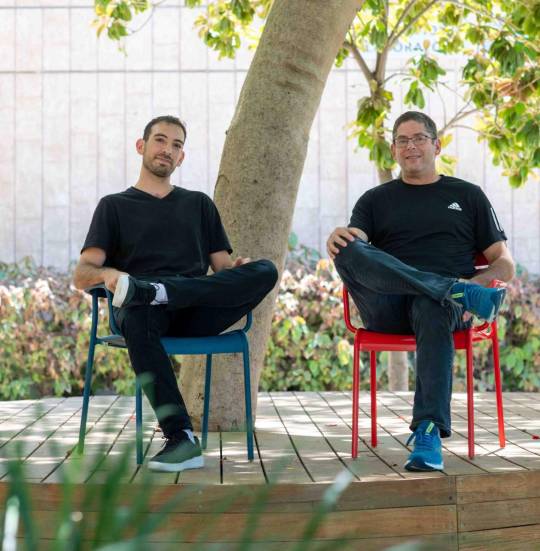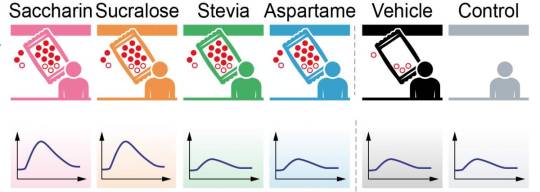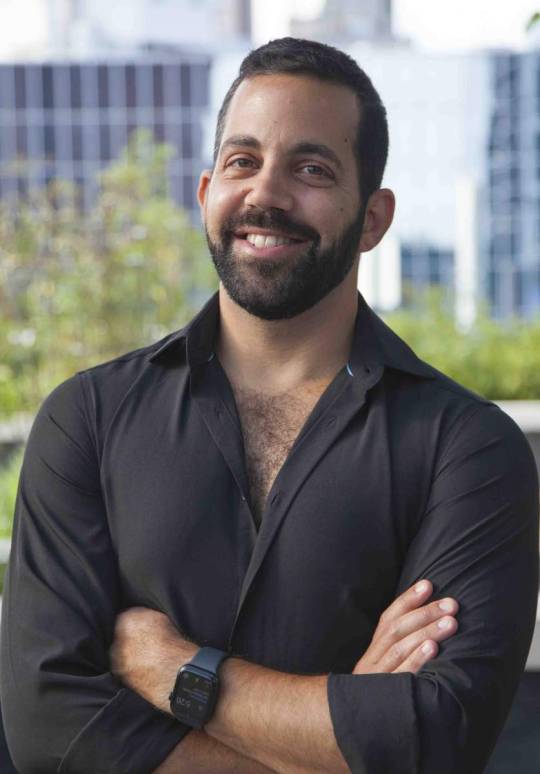#dkfz
Text
[Bref] En Allemagne, la désinformation sur la vape maintient-elle les plus défavorisés dans le tabagisme?
Moins de 2% de la population des plus de 15 ans utilisent le vapotage régulièrement en Allemagne, selon le monitorage Allemand Debra mené entre juin 2016 et novembre 2017. Parmi le panel interrogé, seul le quart des vapoteurs ne fumaient pas. “En Allemagne, le vapotage est principalement consommé en “double-usage” avec une consommation de tabac”, concluent les chercheurs Daniel Kotz et Sabrina…

View On WordPress
#Allemagne#arrêt tabagisme#classes sociales#DEBRA#DKFZ#Europe#groupes sociaux défavorisés#perception du risque#Union Européenne
0 notes
Text
A controlled trial suggests that these non-nutritive sweeteners affect the human gut microbes and may alter glucose metabolism; the effects vary greatly among individuals
Non-nutritive sweeteners – also known as sugar substitutes or artificial sweeteners – are supposed to deliver all the sweetness of sugar without the calories. But a controlled trial conducted by Weizmann Institute of Science researchers, published today in Cell, suggests that contrary to previous belief, such sweeteners are not inert: They do have an effect on the human body. In fact, some can alter human consumers’ microbiomes – the trillions of microbes that live in our gut – in a way that can change a person’s blood sugar levels. And the effects these sweeteners produce vary greatly among different people.

The research was led by Dr. Jotham Suez, a former graduate student of Elinav’s and now principal investigator at the Johns Hopkins University School of Medicine, and Yotam Cohen, a graduate student in Elinav’s lab; it was conducted in collaboration with Prof. Eran Segal of Weizmann’s Computer Science and Applied Mathematics and Molecular Cell Biology Departments.
"Our trial has shown that non-nutritive sweeteners may impair glucose responses by altering our microbiome, and they do so in a highly personalized manner"

The changes induced by the sweeteners in the gut microbes were closely correlated with the alterations in glucose tolerance. “These findings reinforce the view of the microbiome as a hub that integrates the signals coming from the human body’s own systems and from external factors such as the food we eat, the medications we take, our lifestyle and physical surroundings,” Elinav says.

“Our trial has shown that non-nutritive sweeteners may impair glucose responses by altering our microbiome, and they do so in a highly personalized manner, that is, by affecting each person in a unique way,” Elinav says. “In fact, this variability was to be expected, because of the unique composition of each person’s microbiome.”
Adds Elinav: “The health implications of the changes that non-nutritive sweeteners may elicit in humans remain to be determined, and they merit new, long-term studies. In the meantime, it’s important to stress that our findings do not imply in any way that sugar consumption, shown to be deleterious to human health in many studies, is superior to non-nutritive sweeteners."

Study participants included Dr. Rafael Valdés-Mas, Uria Mor, Dr. Mally Dori-Bachash, Dr. Sara Federici, Dr. Niv Zmora, Dr. Avner Leshem, Dr. Melina Heinemann, Raquel Linevsky, Maya Zur, Rotem Ben-Zeev Brik, Aurelie Bukimer, Shimrit Eliyahu Miller, Alona Metz, Ruthy Fischbein, Olga Sharov and Dr. Hagit Shapiro from Elinav’s lab; Drs. Sergey Malitsky and Maxim Itkin from Weizmann’s Life Sciences Core Facilities Department; Dr. Noa Stettner and Prof. Alon Harmelin from Weizmann’s Veterinary Resources Department; and Dr. Christoph K. Stein-Thoeringer from the Microbiome & Cancer Division, German Cancer Research Center (DKFZ).
17 notes
·
View notes
Text
Mengejar PhD #18
Selama bulan April, aku apply 6 PhD position (4 ditolak, 2 gak ada kabar), 1 PhD program (ditolak, padahal udah ngeburu-buru mentor buat ngisi aplikasi referensi by email), dan 1 PhD scholarship AAS (belum ada kabar sampe sekarang).
Selain itu, aku juga mengirim email ke 20 prof untuk menanyakan apakah aku eligible untuk open PhD position mereka. 6 mempersilahkan, 3 menolak, 1 to be confirmed (yang sampe sekarang gak ada kabar), dan sisanya gak bales.
Selain itu aku juga menanyakan ke-eligible-an ku untuk ikut PhD program di DKFZ jerman ke admin. Mereka sih membolehkan ya. Tapi ternyata IELTS requirement-nya 7, sedangkan punya ku 6.5, pas ku tanya lagi soal skor ku yang kurang, eh gak bisa. WKWKWK.
Kemudian mentorku mengeluarkan kalimat,
“Makanya jangan membabi buta”
“Rejection is a way of callibration - Colin Kaepernick”
Indeed, aku begitu terlampau satset sampe capek sendiri, padahal gak ada yang ngejar semacam pig.
Dari ke 6 yang mempersilahkan apply, 4 position tidak ku follow-up karna: 1 position ternyata terlalu jauh dengan bidangku (walau projectnya nutrition), 1 position tidak memberikan scholarship untuk international student (pun jika aku pakai lpdp, univ nya gak masuk list), 1 position prof-nya pindah ke univ lain, dan 1 position itu projectnya aku banget tapi PhD in agriculture.
3 Juli 2022
12 notes
·
View notes
Link
0 notes
Link
0 notes
Text
Small version of a CERN detector could deliver more precise radiotherapy of head tumours
Small version of a CERN detector could deliver more precise radiotherapy of head tumours
Mária Martišíková (left), the project leader from Heidelberg University Hospital and German Cancer Research Center (DKFZ), and DKFZ researcher Laurent Kelleter. (Image: Heidelberg University Hospital / H.Schroeder).
Particle detectors like the ones used by physicists at CERN can have wide applications beyond fundamental research. Scientists from the German National Center for Tumor Diseases (NCT), the German Cancer Research Center (DKFZ), and the Heidelberg Ion Beam Therapy Center (HIT) at Heidelberg University Hospital are now testing a new imaging device supplied by the Czech company ADVACAM on its first patients. The device, which includes a small Timepix3 pixel detector developed at CERN, allows head and neck tumours to be closely monitored during ion radiotherapy, making them easier to target and thus helping limit the treatment’s side effects.
"One of the most advanced methods for treating head and neck tumours involves irradiation with ion beams. This has one unique feature: it can be precisely tailored to the depth inside the human head where the particles should have the maximal effect”, explains Mária Martišíková, the head of the DKFZ team.
Yet like other types of irradiation, ion radiation also has a drawback. The particle beams affect not only the tumour but also part of the healthy tissue around it. This is particularly challenging in the brain, where damage to the optic nerve or a patient’s memory are possible. Ideally, the irradiated area around the tumour should be as small as possible, and the dose to the tumour should be as high as possible. However, current technology does not allow for sufficiently precise targeting of the ions.
To complicate matters further, the situation inside a patient's head can change during therapy. The x-ray computed tomography (CT) scan image taken before treatment is essentially used as a "map" to target the tumour with ion beams. But during therapy, the situation inside the skull may evolve. Until now, physicians lacked a reliable tool to alert them in case of a change in the brain.
The new ADVACAM device could help solve these issues, by improving the navigation of the ion beams inside the head by tracking the secondary particles that are created when ions pass through it.
"Our cameras can register every charged particle of secondary radiation emitted from the patient's body. It's like watching balls scattered by a billiard shot. If the balls bounce as expected according to the CT image, we can be sure we are targeting correctly. Otherwise, it's clear that the 'map' no longer applies. Then it is necessary to replan the treatment," describes Lukáš Marek from ADVACAM.
"We hope the new device will show us how often and where the tumour changes occur. It will allow us to reduce the overall irradiated volume of tissue, saving healthy tissue and reducing the side effects of radiotherapy. We will also be able to apply higher doses of radiation to the tumour" adds Martišíková.
The treatment can benefit enormously from the additional information obtained from the camera. In the first phase, data could lead to an interruption and replanning of the irradiation series when necessary. The ultimate goal is a system that can correct the path of the ion beam in real-time.
The Timepix3 chip developed at CERN is used in the new ADVACAM imaging device. (Image: CERN)
This device exemplifies successful knowledge transfer, showcasing how technology initially developed for detectors used in fundamental physics research can be applied in healthcare.
“When we started developing pixel detectors for the LHC we had one target in mind – to detect and image each particle interaction and thereby help physicists to unravel the secrets of Nature at high energies. The Timepix detectors were developed by the multidisciplinary… https://home.cern/news/news/knowledge-sharing/small-version-cern-detector-could-deliver-more-precise-radiotherapy (Source of the original content)
0 notes
Text
Fwd: Conference: Cambridge_UK.CancerEvolution.May8-10
Begin forwarded message:
> From: [email protected]
> Subject: Conference: Cambridge_UK.CancerEvolution.May8-10
> Date: 22 February 2024 at 07:03:02 GMT
> To: [email protected]
>
>
> Cancer Evolution: from Genome to Ecology 2024 conference is taking place
> 8-10 May 2024 on the Wellcome Genome Campus, near Cambridge, UK
>
> You will have the opportunity to engage with a community of global
> scientists working in evolutionary biology, cancer research, and clinical
> practice, and share novel ideas to shape thinking on the future of
> precision medicine in treating cancer.
>
> This Wellcome Connecting Science conference is being held in collaboration
> with the International Society for Evolution, Ecology and Cancer (ISEEC).
>
> Sessions will focus on:
>
> - Modelling the evolution of cancer
>
> - Aging and cancer
>
> - Phenotypic plasticity
>
> - Spatial biology and ecology
>
> - Beyond the genome
>
> - Data visualisation and cross-disciplinary learning
>
> Receive expert feedback by sharing your research as a short talk, poster
> pitch talk or poster presentations.
>
> Submit your abstract by 12 March 2024. Registration deadline (In-person):
> 9 April 2024; Registration deadline (Virtual): 30 April 2024
>
> - Click this link to find out more about the conference on our website: (
> https://ift.tt/Ae4ZcMr
>
> Committee
>
> Athena Aktipis - Arizona State University, USA
>
> Rebecca Fitzgerald - University of Cambridge, UK
>
> Moritz Gerstung- Deutsches Krebsforschungszentrum (DKFZ), Germany
>
> Carlo Maley - Arizona State University, USA
>
> Conference speakers
>
> James DeGregori (Keynote) - University of Colorado, USA
>
> N�ria L�pez-Bigas (Keynote) - Institute for Research in Biomedicine
> Barcelona, Spain
>
> David Fernandez Antoran - Fundaci�n Instituto de Investigaci�n Sanitaria
> Arag�n, Spain
>
> Amy Boddy - University of California Santa Barbara, USA
>
> Trevor Graham - Institute of Cancer Research, UK
>
> Michael L�ssig - University of Cologne, Germany
>
> Laura Machesky - University of Cambridge, UK
>
> Christoph Plass - German Cancer Research Center (DKFZ), Germany
>
> Raheleh Rahbari - Wellcome Sanger Institute, UK
>
> Amanda Rossiter - University of Birmingham, UK
>
> Maria Secrier - University College London, UK
>
> Arne Traulsen - Max-Planck-Institute for Evolutionary Biology, Germany
>
> Jos� Tub�o - Center for Research in Molecular Medicine and Chronic
> Diseases, Spain
>
>
> The Wellcome Sanger Institute is operated by Genome Research
> Limited, a charity registered in England with number 1021457 and a
> company registered in England with number 2742969, whose registered
> office is Wellcome Sanger Institute, Wellcome Genome Campus,
> Hinxton, CB10 1SA.
>
>
> Jane Murphy
0 notes
Text
(52) PhD, Postdoctoral and Academic Positions - The German Cancer Research Center (DKFZ)

(52) PhD, Postdoctoral and Academic Positions - The German Cancer Research Center (DKFZ)
The German Cancer Research Center (DKFZ) invites application for vacant (52) PhD, Postdoctoral and Academic Positions The German Cancer Research Center (DKFZ) invites application for vacant PhD, Postdoc and Academic Positions, the largest biomedical institution in Germany in the field of cancer research. Wissenschaftliche:r Mitarbeiter:in (m/w/d) im Bereich Empirische Medizinethik in Teilzeit (65%): Begleitforschung zur Patientenbeteiligung NCT Heidelberg – Sektion Translationale Medizinethik Heidelberg NewStudentische Hilfskraft (w/m/d) für 16 Stunden/Monat NCT Dresden – Presse- & Öffentlichkeitsarbeit Dresden NewStudentische Hilfskraft (m/w/d) in Teilzeit (16 Std./Monat) Next Generation Sequencing (NGS) Core Facility Heidelberg NewPhD Student on the topic “Forward genetics approach to delineation
Read the full article
0 notes
Text
Teilnehmer:innen für die MERLIN-Studie gesucht: Fatigue
Das Deutschen Krebsforschungszentrum (DKFZ) führt in Kooperation mit dem Universitätsklinikum Heidelberg eine Online-Studie zur Entwicklung eines wirkungsvollen Früherkennungsprogramms von Fatigue bei Krebs durch. Teilnehmen können Patient:innen, bei denen eine Krebstherapie geplant oder kürzlich gestartet ist, aber noch nicht länger als seit einem Monat läuft.Fatigue äußert sich durch…

View On WordPress
0 notes
Text
DKFZ PhD Student in Genomics / Transcriptomics of Blood and Brain Cancers
DKFZ
We have an opening for a @DKFZ /DKTK-supported Ph.D student in cancer bioinformatics! First round applications due July 3. #bioinformatics #phd
See the full job description on jobRxiv: https://jobrxiv.org/job/dkfz-27778-dkfz-phd-student-in-genomics-transcriptomics-of-blood-and-brain-cancers/?feed_id=49276
#ScienceJobs #hiring #research #cancer #python #r
Düsseldorf #Germany #Bioinformatician #Scientist
0 notes
Text
Seriöse Studie des DKFZ: Tägliche Einnahme von Vitamin D3 senkt Krebssterblichkeit
14 wissenschaftliche Studien der höchsten Qualitätsstufe hat das Deutsche Krebsforschungszentrum DKFZ sorgsam ausgewertet, um den Einfluss von Vitamin D3 auf die Krebssterblichkeit zu sondieren. Zuerst schien es so, als gäbe es keinen Zusammenhang, doch dann machten die Forscher eine Entdeckung. Tägliche niedrigere Dosierung ergab eine signifikante Wirkung An den vom DKFZ ausgewerteten Studien nahmen insgesamt … https://bit.ly/43ktUUg
0 notes
Text
Reduced cancer mortality with daily Vitamin D intake
https://www.dkfz.de/en/presse/pressemitteilungen/2023/dkfz-pm-23-27-Reduced-cancer-mortality-with-daily-vitamin-D-intake.php
Comments
0 notes
Link
0 notes
Text
https://www.dkfz.de/en/presse/pressemitteilungen/2013/dkfz-pm-13-03-Liver-Controls-Cachexia-in-Cancer.php

…

https://www.cancer.net/coping-with-cancer/physical-emotional-and-social-effects-cancer/managing-physical-side-effects/weight-loss
…

https://www.asco.org/practice-patients/guidelines/supportive-care-and-treatment-related-issues
…

https://www.cancer.net/blog/2019-11/small-changes-help-food-taste-better-when-you-have-cancer
1 note
·
View note
Text
Scientists identify new driver for rare type of liver cancer
Scientists identify new driver for rare type of liver cancer
Scientists from the German Cancer Research Center (Deutsches Krebsforschungszentrum, DKFZ) and the Hebrew University in Jerusalem have identified in mice the cell of origin of combined liver/biliary duct carcinomas, a rare type of cancer of the liver. The pro-inflammatory immune messenger interleukin 6 (IL-6) was found to be the driver of carcinogenesis. Blocking of IL-6 reduced both the number…

View On WordPress
0 notes
Text
(52) PhD, Postdoctoral and Academic Positions - The German Cancer Research Center (DKFZ)

(52) PhD, Postdoctoral and Academic Positions - The German Cancer Research Center (DKFZ)
The German Cancer Research Center (DKFZ) invites application for vacant (52) PhD, Postdoctoral and Academic Positions The German Cancer Research Center (DKFZ) invites application for vacant PhD, Postdoc and Academic Positions, the largest biomedical institution in Germany in the field of cancer research. Wissenschaftliche:r Mitarbeiter:in (m/w/d) im Bereich Empirische Medizinethik in Teilzeit (65%): Begleitforschung zur Patientenbeteiligung NCT Heidelberg – Sektion Translationale Medizinethik Heidelberg NewStudentische Hilfskraft (w/m/d) für 16 Stunden/Monat NCT Dresden – Presse- & Öffentlichkeitsarbeit Dresden NewStudentische Hilfskraft (m/w/d) in Teilzeit (16 Std./Monat) Next Generation Sequencing (NGS) Core Facility Heidelberg NewPhD Student on the topic “Forward genetics approach to delineation
Read the full article
0 notes